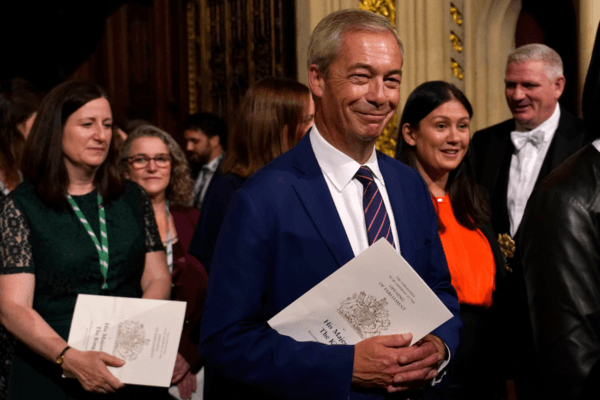Nigel Farage has said he is passing control of Reform UK, as a company and as a party.
Unlike most other political parties, Reform is a limited company and Farage owns 60 percent of the shares. Farage explained that the party was structured that way to make it easier for him to make “very fast decisions.”
But he said the most important reason was “to prevent a small, nascent political party being taken over by malign actors. That was my really big fear.”
The Clacton MP said he told his new constituents in the early hours of July 5 “that I was there to represent the people of Clacton in Parliament, but that as party leader, I would professionalise and democratise the party.”
He continued: “So I’ve now made a decision. I no longer need to control this party. I’m going to let go. We will change the structure of the party from one limited by shares to a company limited by guarantee, and that means it’s the members of Reform that will owe this party.
“I am relinquishing control of the company, and indeed of the overall control of the party.”
A ‘Beachhead in Parliament’
Farage had tried seven times, unsuccessfully, to win a seat in the House of Commons but in the 2024 election took the seaside constituency of Clacton in Essex, ousting the sitting Conservative MP Giles Watling.“We’ve proved that if you vote Reform, you will get Reform,” he said.
‘Real Opposition’
Reform UK managed to take seats from both Labour and the Conservatives in the General Election.Party Chairman Richard Tice won Boston and Skegness in Lincolnshire and businessman Rupert Lowe won Great Yarmouth—both gains from the Conservatives.
Lee Anderson, formerly a Conservative, retained his seat in Ashfield, Nottinghamshire.
The party won a fifth seat days later after a recount in Basildon South and East Thurrock gave candidate James McMurdock victory over Labour by just 98 votes.

Speaking days after gaining the Clacton seat, the Reform UK leader said that with a couple of exceptions, he thought Prime Minister Sir Keir Starmer’s new government was comprised of “the most inexperienced people ever to have got into a British cabinet.”
“If you actually look at their life stories, their backgrounds and bear in mind, these are people making executive decisions that fundamentally affect people’s lives, I think they’re going to find it very, very hard. And I say that because the country faces some really fundamental problems, I suspect this government could be in trouble pretty quickly,” he said.
Farage, a former leader of UKIP, had represented South East England in the European Parliament since 1999 until the UK formally left the EU on Jan. 31, 2020. In 2018, he formed The Brexit Party—which was rebranded Reform in 2021—which went on to become the largest UK party in the European Parliament in 2019.







